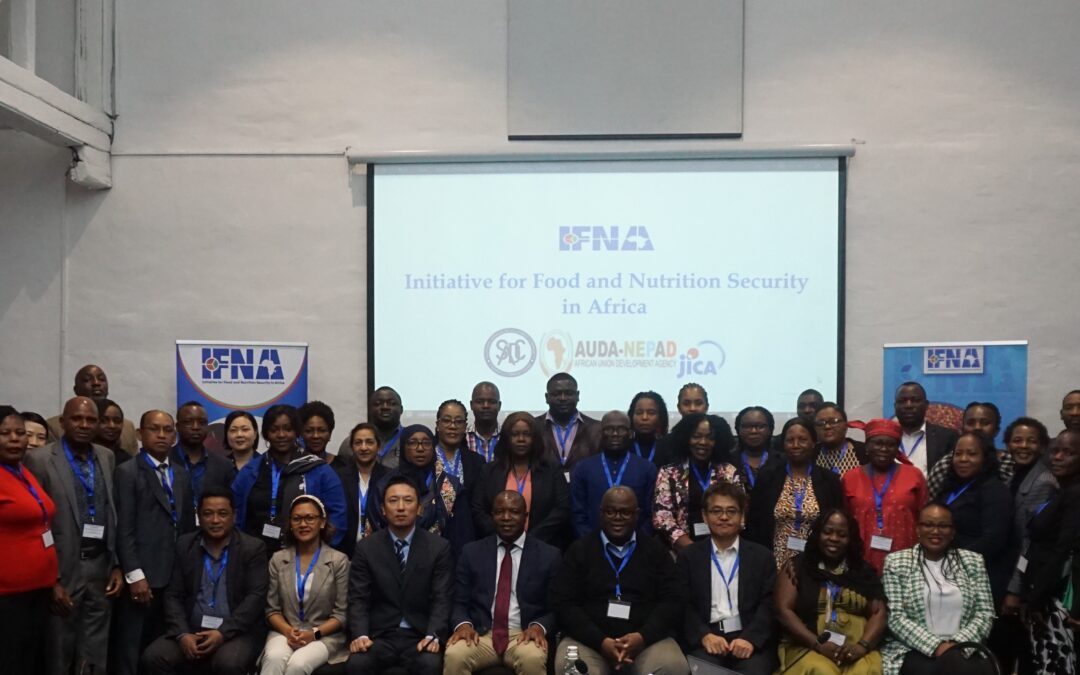Training Dates: 26th – 28th, August 2024
Venue: Protea Hotel, Balalaika in Sandton, Johannesburg, South Africa
Introduction
The Initiative for Food and Nutrition Security in Africa (IFNA) Regional Training jointly organized by the African Union Development Agency (AUDA-NEPAD) and Southern African Development Community (SADC) commenced on the 26th until 28th of August 2024 in Sandton, South Africa. All the Southern African Development Community (SADC) countries including members from AUDA-NEPAD, UNICEF, JICA and FAO where represented. The Initiative for Food and Nutrition Security in Africa (IFNA) Regional Training targets to contribute to the improvement of nutrition status of the African people in line with Malabo Declaration and SDG 2, particularly towards the malnutrition reduction in its different forms including undernutrition and micronutrient deficiencies.
The IFNA training also aimed to establish a framework for collaboration with African countries, to accelerate the implementation of the countries’ food and nutrition security policies aligning National and Regional Agriculture Investment Plan based on the CAADP framework. To achieve this, IFNA will assist the national governments by 1) building capacity of the government technical staff involved in food security and nutrition policy and program development and their implementation, as well as 2) supporting the alignment of country needs on resources that would assist in implementation of interventions at sub-national level. IFNA plans to roll out the regional training to promote nutrition sensitive programming based on IFNA’s two approaches – Multi Sectoral Approach (MSA) and Nutrient Focused Approach (NFA).
Objective
The IFNA Regional Training targeted all member states from the Ministry of Agriculture, Nutrition and Health sector, aiming to equip, increase and enhance the knowledge and skills of the member states to better contextualize multi-sectoral nutrition sensitive programming regarding the national food and nutrition security policy, ensuring access to resources for implementation.
Expected Outcomes
By the end of the IFNA Regional Training, the member states were able to:
- Understand the basic and underlying causes of malnutrition to identify and plan to fill the nutrition gaps.
- Describe the linkages and complementarity among different sectors that contribute to nutrition improvement.
- Apply the concept of Multi-sectoral Approach (MSA) and Nutrient focus Approach (NFA).
- Understand and be able to use the “NFA App” to identify locally available nutrition dense foods to fill the nutrient gap in specific contexts.
- Identify priority nutrition issues and potential interventions to be included in the Multi-sectoral Action Plans.
Country Presentations
All the member states presented their country’s presentations and the following points were highlighted:
- The politics and certain cultural and traditional practices affect nutrition in Madagascar. The delegates mentioned that they need to implement strategically address their national plan for multisectoral action for nutrition to ensure the food security.
- In Mauritius, the delegate mentioned the plan to develop a road map to reduce obesity by 5% among the Mauritian population. The Mauritian delegates need technical assistance from SADC regarding the issue of obesity and anaemia.
- In Lesotho, there is a high level of political involvement in nutritional issues, and regarded as a good practice.
- In the Seychelles, the delegate explained that the school feeding programme offers breakfast and lunch to children with the consent of their parents. The main issues highlighted in Seychelles are overweight, obesity, anaemia since there is high reliance on imported food.
- Mozambique delegate outlined the good practice that includes the social intervention where they support families and children who are the head of the households.
- In Namibia, there is a plan to highlight the policies in draft form, also develop strategies, and continue to follow the policies.
- In Zimbabwe, the delegate noted that the ministry is trying to make means to support nutrition.
- Tanzanian delegate highlighted good practices that includes the community involvement and participation, school feeding programme, and offering 1000 shilling to every kid under 5 years.
She also noted the main issue is still anaemia in pregnant woman but they are doing well in exclusive breastfeeding.
- In Malawi, they introduced the breastfeeding corners at workplace and public spaces such as banks including the parliament.
- Botswana delegate highlighted the good practice that includes the use of locally produced products to supports local businesses. She also mentioned the challenges such as the lack of adequate synergy or the silos mentality in Botswana.
Action Plans:
On Day 3 of the training, the member states presented their actions plans and the following key issues where addressed:
- Interventions to reduce obesity
- Diet not allowed to be consumed by pregnant woman
- Anaemia in pregnant woman
- School feeding programmes (e.g. In Mozambique, the programme is not covering everyone so far.)
- Supplements intake and promotion in Angola, especially within teenagers
- Stunting (Botswana plans to reduce 40% in 5 years)
- Food insecurity
- Poor nutrition affecting complementary feeding among children
- Poor breastfeeding
Recommendations
- The promotion of multi-sectoral improvement, and the increase in intake of local crops.
- Shunichi Nakada (JICA, Headquarters) advised the member states to incorporate the existing idea with the ones already present in their countries. He also mentioned that health expect need to guide the agriculture expert on what and how much to produce to address the issues of food scarcity.
- The involvement of academics in data collection for a long term planning and the kind of indicators to use.
- Developing proper strategies and the application of holistic approach to reduce stunting.
- The development of tools, approaches and for all the 16 member states to collaborate with each other to share good practices and strategies.
- The member states to propose funding to JICA for production of food and guidelines.

Recent Comments